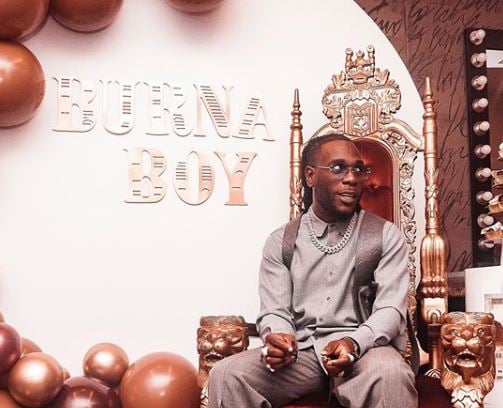Everyone knows it. Eyes are watching. Minds are rethinking possibilities. Music consumers and creatives alike have their hearts in their mouths, observing his every move for minute predictive clues ahead of the long-awaited moment.
There’s no gainsaying that there’s an unusual interest in Damini ‘Burna Boy’ Ogulu’s stake as the 28-year-old Afro-fusion singer stands a chance of snagging a plaque at the 2020 Grammys on Sunday evening — just one year after he dominated the limelight as an Afrocentric artiste.
It didn’t help our anxiety that Burna took to his Twitter — two days to the D-Day, asking if fans could “keep a secret” in a move that suggested he, PERHAPS, already got notified by the Academy that he’ll be getting an award, just so his presence is guaranteed.
But beyond wild speculations and hearsays, many would agree that a game-changing peculiarity heightening Burna’s chances ahead of the 62nd Grammys is the fact that his critically acclaimed ‘African Giant’ album came at a point when the west seems to finally be grasping the Afrobeat concept.

While he further gained traction as a thriving creative in 2019, the singer had long had his grip on fame, joining forces with the likes of Wizkid in collaborative hits and drawing inspiration from Afrobeat pioneer Fela Kuti, before the global spotlight finally beamed on him.
Burna Boy before ‘African Giant’
Burna had debuted his first studio album ‘L.I.F.E’ in August 2013. This had come sequel to his 2011 mixtapes including ‘Burn Identity’ and is reported to have sold over 40,000 copies on the first day of its release alone.
Upon graduating from high school, the Port Harcourt-born music star had temporarily migrated to the United Kingdom, where he enrolled in college, but later gave up on tertiary education and returned to Nigeria to pursue his passion in music-making.
He had started making beats at 10 but kick-started his career in 2010 when he signed a two-year contract with Aristokrat Records, a label he later left in 2014 for his own imprint Spaceship Entertainment.
Fusing dancehall, reggae, Afro-beat, and pop, Burna Boy, over the course of time, emerged as one of Nigeria’s fastest rising stars, having paved way for himself in 2012 with his breakout single ‘Like to Party‘, which keeps topping playlists till date.

‘African Giant’ album & the Coachella font controversy
Aface his fast-growing fanbase within Nigeria and critical global acclaims trailing his collaborative projects with the likes of Lilly Allen and Fallout Boy, Burna had sold out his O2 Academy concert in 2018.
With three albums and two EPs to his name already — including ‘On a Spaceship’ and ‘Outside’ — the Afrofusion crooner, was, in no time, billed to showcase his skills to the world at the 2019 Coachella Festival alongside Mr Eazi, a Nigerian singer-cum-songwriter.
But, unlike many expected, Burna was soon in a face-off with organizers of the annual festival after he was unable to spot his name on the lineup while peering at the graphics from the comfort of his toilet seat.
Lashing out at Coachella, Burna flared up and dubbed himself an ‘African Giant’ after deeming the “writing of his name in small fonts,” unlike those of some other global stars — an attempt at belittling him.
Reacting to the disapproval from Nigerians, the then-enraged singer had quickly thrown words like “backward unprogressive fools,” adding that many citizens from the country aren’t mentally advanced enough to fight for themselves.
However, events succeeding these would later see him go on a rampage in serial media interviews to better explain himself and this single development further ushered the unorthodox “Afrofusion god” into the global limelight in no time.
Burna Boy’s potential win and the prospects for Afrobeats, Nigeria’s showbiz
As showbiz moguls looked to spritz their music style with deft touches of the much-acclaimed Afrobeat genre, Beyonce had joined the bandwagon and enlisted Burna Boy, among other Nigerian superstars, for her 2019 ‘Lion King’ project.
However, what augmented Burna’s international acclaim came to be that his successive studio album, which he later revealed was unplanned, came to bear an identical name with his then-controversial ‘African Giant’ mantra.

As a result, many, both in Nigeria and in the diaspora, developed a keen interest in “whatever it is the singer had to offer.” In no time, the body of work ended up with massive numbers across streaming platforms, earning the singer a slew of awards and heated accolades.
From his BET win as the ‘Best International Act’ of 2019, Burna went ahead to snag AFRIMA’s plaque in the ‘Best Male Artiste in West Africa’ category, earning a nomination for the 2020 Grammys.
While we can only make predictions, watch the D-day play out, and analyze the impacts of a possible win, there are many that are confident about Burna’s chances, after having observed the manner in which fans readily chanted the singer’s name for his categories at the 2019 AFRIMA.
Amid the rapidly intensifying scramble for Africa, a Grammy to Burna Boy’s name could potentially open the floodgates of showbiz deals unlike ever before, not for the singer alone, but for Nigeria’s many creatives as well.
This could also rub off on Nollywood and augment the industry’s recent successes — with many Africa-oriented narratives waiting to be re-told. Perhaps it might also change the perspective of Nigerian creatives who have long been said to have a penchant for edging toward eurocentrism.
Copyright 2025 TheCable. All rights reserved. This material, and other digital content on this website, may not be reproduced, published, broadcast, rewritten or redistributed in whole or in part without prior express written permission from TheCable.
Follow us on twitter @Thecablestyle


Wow